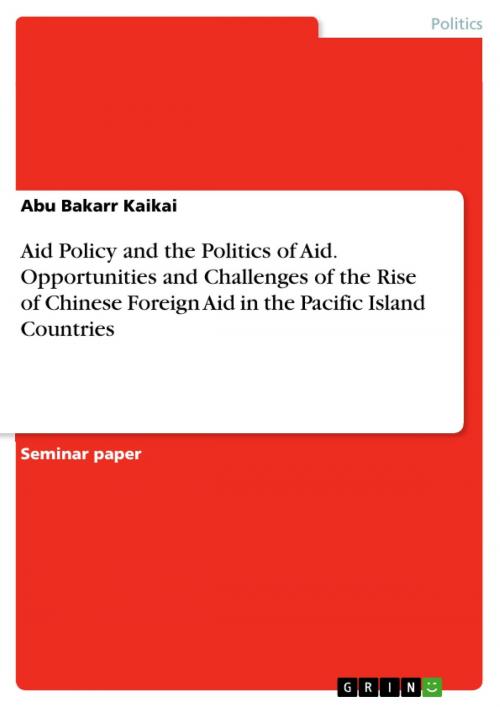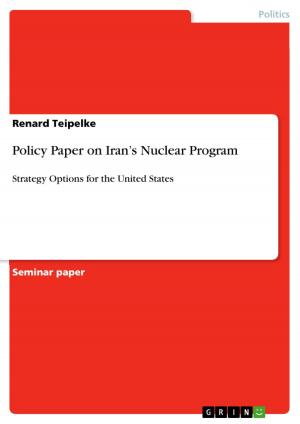Aid Policy and the Politics of Aid. Opportunities and Challenges of the Rise of Chinese Foreign Aid in the Pacific Island Countries
Nonfiction, Social & Cultural Studies, Political Science, International, International Relations| Author: | Abu Bakarr Kaikai | ISBN: | 9783668072596 |
| Publisher: | GRIN Publishing | Publication: | October 22, 2015 |
| Imprint: | GRIN Publishing | Language: | English |
| Author: | Abu Bakarr Kaikai |
| ISBN: | 9783668072596 |
| Publisher: | GRIN Publishing |
| Publication: | October 22, 2015 |
| Imprint: | GRIN Publishing |
| Language: | English |
Seminar paper from the year 2015 in the subject Politics - International Politics - Region: Far East, grade: D (Distinction), Murdoch University, course: Development Studies, language: English, abstract: This essay analyses the key stakeholders representing Chinese aid and subsequently discusses the opportunities and challenges of Chinese aid to the Islanders. It argues that Chinese aid is commercially driven. Although it has been provided for strategic interests, it has further offered new opportunities and challenges for the Pacific countries. The essay first examines the Chinese rise and the characteristics of its international aid programmes. Next it focuses on the role of development aid in the Pacific and determines whether aid has been utilised for political gains. Over the last two decades, China has emerged as a leading provider of development aid assistance in developing countries in Africa, Latin America and in recent times, in the Pacific Islands. China's quest to maintain its increasing population and continue to expand its economic growth at world stage level has exacerbated China's engagement with resource developing countries. This increasing intensification of China's development aid programme in developing countries has been prominent towards the late 1990s, mostly driven by the China 'go out' strategy. The 'go out' strategy is China's aid model that combines both private and State-Owned Enterprises (SEOs) to venture into resource-based countries to create market-led investment through support from the Chinese government. The overarching focus of China's development aid is to assist other developing countries achieve their self-development objectives. The Chinese policy is framed within the context of accessibility to natural resources, such as oil, mining and gas in exchange for promoting growth in developing countries. This approach to aid seems to be changing the way development aid had been delivered. But critics of rising Chinese aid and diplomacy particularly in the Pacific Island countries are suspicious and doubtful of what Chinese motivation in Oceania could be. Some scholars, for instance Henderson and Reilly (2003), unequivocally claim that Chinese intensification in Pacific countries will destabilise the relationship between the United States and the Island countries, alluding to the Cold War between China and the US. Similarly, Windybank (2005) asserts that Chinese aid is given as a recipe to undermine Taiwan's interest. However, others have argued that Chinese aid in the Pacific is commercially led and geared towards increasing aid visibility and providing alternatives for the Islanders, and not geopolitical in nature.
I hold a Masters degree in Development Studies and a Bachelor degree in Education with several years experience in teaching, training and capacity building. In recent years, I have pursue a career in procurement, logistics and stores' management; and I have serve in different capacities working as procurement officer with government institutions at both local and national levels. I am looking forward to taking up employment in development and humanitarian services.
Seminar paper from the year 2015 in the subject Politics - International Politics - Region: Far East, grade: D (Distinction), Murdoch University, course: Development Studies, language: English, abstract: This essay analyses the key stakeholders representing Chinese aid and subsequently discusses the opportunities and challenges of Chinese aid to the Islanders. It argues that Chinese aid is commercially driven. Although it has been provided for strategic interests, it has further offered new opportunities and challenges for the Pacific countries. The essay first examines the Chinese rise and the characteristics of its international aid programmes. Next it focuses on the role of development aid in the Pacific and determines whether aid has been utilised for political gains. Over the last two decades, China has emerged as a leading provider of development aid assistance in developing countries in Africa, Latin America and in recent times, in the Pacific Islands. China's quest to maintain its increasing population and continue to expand its economic growth at world stage level has exacerbated China's engagement with resource developing countries. This increasing intensification of China's development aid programme in developing countries has been prominent towards the late 1990s, mostly driven by the China 'go out' strategy. The 'go out' strategy is China's aid model that combines both private and State-Owned Enterprises (SEOs) to venture into resource-based countries to create market-led investment through support from the Chinese government. The overarching focus of China's development aid is to assist other developing countries achieve their self-development objectives. The Chinese policy is framed within the context of accessibility to natural resources, such as oil, mining and gas in exchange for promoting growth in developing countries. This approach to aid seems to be changing the way development aid had been delivered. But critics of rising Chinese aid and diplomacy particularly in the Pacific Island countries are suspicious and doubtful of what Chinese motivation in Oceania could be. Some scholars, for instance Henderson and Reilly (2003), unequivocally claim that Chinese intensification in Pacific countries will destabilise the relationship between the United States and the Island countries, alluding to the Cold War between China and the US. Similarly, Windybank (2005) asserts that Chinese aid is given as a recipe to undermine Taiwan's interest. However, others have argued that Chinese aid in the Pacific is commercially led and geared towards increasing aid visibility and providing alternatives for the Islanders, and not geopolitical in nature.
I hold a Masters degree in Development Studies and a Bachelor degree in Education with several years experience in teaching, training and capacity building. In recent years, I have pursue a career in procurement, logistics and stores' management; and I have serve in different capacities working as procurement officer with government institutions at both local and national levels. I am looking forward to taking up employment in development and humanitarian services.















